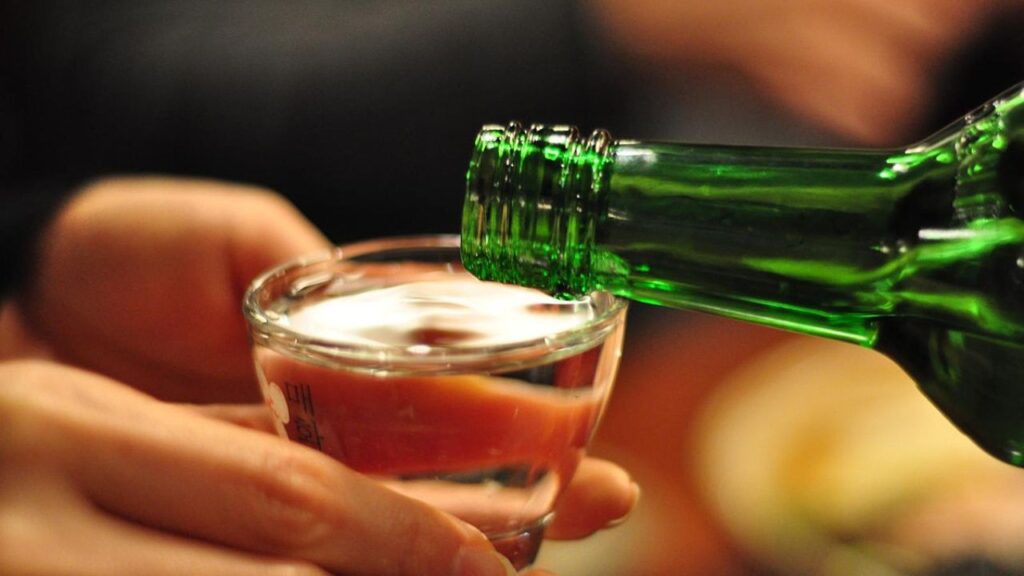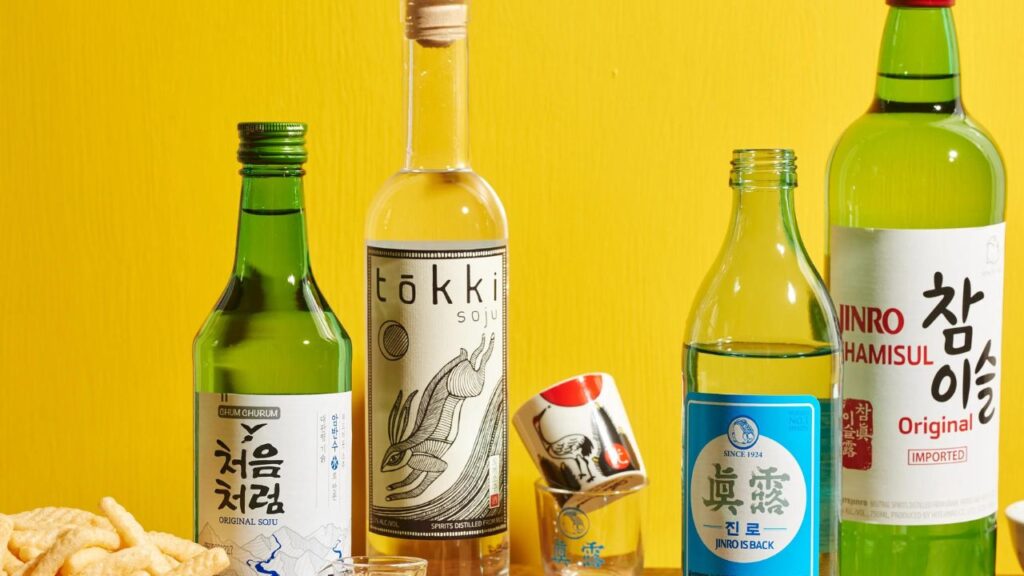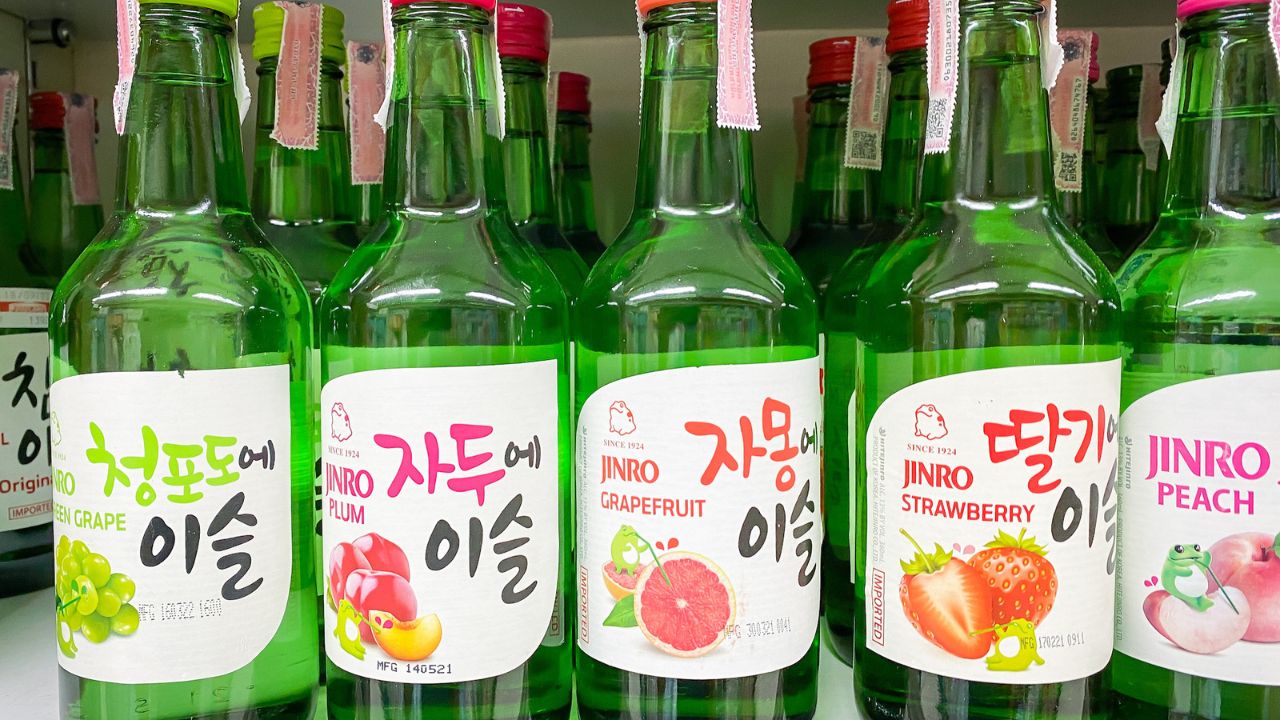Is Soju Gluten Free? Soju is typically gluten-free, as it’s traditionally made from rice. However, some varieties may use wheat or barley, so it’s important to check the ingredients.
More people are becoming aware of what foods and beverages fit within their dietary limits as gluten-free diets continue to gain popularity.
Soju, the renowned Korean spirit that is becoming more and more well-known overseas, is one of the many drinks to take into account.
Though many people believe that alcohol is gluten-free, the reality is not so simple.
If you enjoy this versatile and silky beverage or are just curious to give it a try, you may be wondering if soju is gluten-free.
We will cover all you need to know about soju in this post, including its components, how it is made, and how to make sure the option you choose is gluten-free.
Contents
What Is Soju?
A Brief History of Soju
Soju has a rich and storied history, tracing back to the 13th century during the Goryeo Dynasty in Korea.
The Mongols, who introduced distillation techniques from the Middle East, had an influence on the early soju distillation processes.
Over the centuries, soju evolved and became deeply ingrained in Korean culture, but these methods combined with Korean ingredients would produce what would become the nation’s favorite drink.
One of the most popular alcoholic drinks in the world today is soju, especially in South Korea where it is a common social beverage. [Is Soju Gluten Free?]
Ingredients Used in Traditional Soju
Soju is traditionally made from grains, such as rice, barley, or even sweet potatoes. The traditional recipe called for rice, which was widely available in Korea, was centered around this grain.
But as time went on, soju manufacturing techniques changed, and substitute ingredients included starches like sweet potatoes, tapioca, and wheat.
Because of the range of ingredients used, some soju may not be gluten-free while others might be. [Is Soju Gluten Free?]

Is Soju Gluten-Free?
Traditional Soju and Gluten-Free Status
Rice, which is naturally gluten-free, is used to make soju in its traditional form. [Is Soju Gluten Free?]
You can therefore enjoy your drink without worrying about gluten if you buy a bottle of soju that is made entirely of rice or other gluten-free starches like sweet potatoes.
Rice-based soju can be a safe and tasty alternative for people who have celiac disease or gluten sensitivity.
Modern Soju Production Methods
Nonetheless, the production of soju has expanded in the modern era, and numerous brands have begun experimenting with different ingredients.
Although soju is distilled, there is still a chance that it will contain gluten because some distillation processes use wheat or barley, which are gluten-containing ingredients.
It is likely that traces of gluten will remain in the finished product if gluten-containing grains are used in the production or fermentation process.
Moreover, a lot of soju brands create flavored versions, which adds another worry for people who are trying to avoid gluten. [Is Soju Gluten Free?]
Complicating matters further, flavored soju may include colorings, flavorings, or additives derived from gluten-containing materials.
Why Gluten Might Be Present in Certain Brands
The question of why some soju brands contain gluten comes down to taste and cost: barley and wheat can be cheaper than rice, and they can also change the soju’s flavor profile to suit the tastes of specific consumers.
As a result, some brands incorporate wheat or barley into their ingredient mix or use them during the fermentation process [Is Soju Gluten Free?].
Unfortunately, there may be a risk here for people who are sensitive to gluten.
It is crucial to know what is in your bottle of soju because even minute amounts of gluten can trigger reactions in those with severe gluten intolerance or celiac disease.
How to Choose Gluten-Free Soju?
Reading Ingredient Labels
Reading the ingredients carefully on the label is one of the simplest ways to make sure the soju you are drinking is gluten-free. Many reputable soju brands list their ingredients, which will help you avoid grains like wheat and barley that contain gluten.
When a bottle does not list all of the contents, it is best to assume the worst and presume it contains gluten.
It is also important to remember that different nations have different labeling regulations. [Is Soju Gluten Free?]
Gluten-free products are easier to find in areas where the product’s label must specifically state that it is gluten-free.
In areas where this is not the case, further investigation may be necessary.
Look for Gluten-Free Certification
You can feel more confident about a product by reading labels carefully and checking for a gluten-free certification on the bottle [Is Soju Gluten Free?].
Some soju producers go to great lengths to obtain gluten-free certification for their goods; these labels are usually located on the front or back of the bottle.
Having this certification guarantees that no gluten-containing ingredients were used during the soju’s production and that it was done so in a gluten-free environment.
Contacting Manufacturers
It is wise to get in touch with the manufacturer directly if you have any questions. [Is Soju Gluten Free?]
Reputable businesses typically welcome consumer inquiries and are open and honest about their ingredients and production methods.
You can be certain that the product you are eating is suitable for your dietary requirements by getting in touch with the manufacturer.
Be Aware of Cross-Contamination
Even though some soju might not contain gluten directly, if the distillery makes both gluten-containing and gluten-free products, there is always a chance of cross-contamination.
Make sure the facility producing the soju also handles gluten-containing grains if you suffer from a severe gluten intolerance.

Popular Gluten-Free Soju Brands
You can enjoy the beverage without worrying about gluten contamination because a number of soju brands are known to produce gluten-free varieties. Here are some of the most well-liked gluten-free options:
Jinro
One of the most well-known soju brands worldwide, Jinro offers a variety of soju products, including traditional rice-based soju.
Although many of Jinro’s soju products are thought to be gluten-free, it is still a good idea to make sure you are purchasing the right kind because some of their flavored soju may contain additives made of gluten.
Hwayo
Premium brand Hwayo Soju takes pride in producing its soju using age-old rice-based techniques. [Is Soju Gluten Free?]
Hwayo soju is usually free of gluten as a result, making it a premium choice for people who are sensitive to gluten.
Hwayo is a well-liked option for people looking for a more sophisticated soju experience because of its clear, pure flavor.
Charm Soju
Charm Soju, another rice-based gluten-free option, is frequently recommended as a good gluten-free option for people looking for a traditional taste without the risk of gluten contamination.
As with other brands, it is best to confirm the contents of each bottle to make sure it satisfies your dietary needs. [Is Soju Gluten Free?]
Substitutes for Soju in Gluten-Free Diets
There are a number of gluten-free alcoholic beverages available if you are having trouble finding gluten-free soju or would like to look into other options:
- Sake: Like soju, sake is made from rice and is naturally gluten-free. It offers a smooth, light flavor similar to soju, making it a good alternative.
- Tequila: Pure tequila made from 100% agave is another gluten-free option. It pairs well with a variety of mixers and is widely available.
- Rum: Distilled from sugarcane, rum is a gluten-free spirit that can be enjoyed in various cocktails or on its own. [Is Soju Gluten Free?]
- Vodka (from non-gluten grains): While some vodkas are made from gluten-containing grains like wheat or barley, many are distilled from potatoes or corn, making them gluten-free.
Final Verdict
In general, traditional soju made from rice or sweet potatoes is gluten-free, making it a safe option for those following a gluten-free diet. However, the answer to the question “is soju gluten-free?” is “it depends.”
But a lot of contemporary brands have started adding wheat or barley—which contains gluten—to their recipes.
Always verify the ingredients list, seek out a gluten-free certification, or get in touch with the manufacturer directly to be safe. [Is Soju Gluten Free?]
With soju’s global appeal growing, it is getting easier to find gluten-free versions.
If you do your homework and read labels carefully, you can still enjoy this traditional Korean spirit while following a gluten-free diet.
See Also: Is Blue Cheese Gluten Free?
FAQs
Is all soju gluten-free?
Unfortunately, not all soju is gluten-free. While traditional soju made from rice is usually gluten-free, some contemporary brands may use gluten-containing wheat or barley.
Is soju safe for those who have celiac disease?
Yes, as long as soju is made from gluten-free ingredients (such as rice or sweet potatoes), it is safe for people with celiac disease to consume. However, make sure to always check the ingredients before consuming.
Does gluten exist in Jinro soju?
Jinro soju, especially the traditional rice-based varieties, is typically gluten-free, but it is always a good idea to double-check the product’s ingredients, especially if you are thinking about trying one of the flavored varieties.
Which type of alcohol is totally gluten-free?
Completely gluten-free options include sake, pure tequila, rum, and vodka made from non-gluten grains (like corn or potatoes). [Is Soju Gluten Free?]
Can wheat be used to make soju?
Yes, some soju can be distilled using gluten-containing wheat or barley. If you have a strict gluten-free diet, make sure to double-check the ingredients before consuming.
Conclusion: Is Soju Gluten Free?
In conclusion, not all soju varieties are gluten-free. [Is Soju Gluten Free?]
For those with gluten sensitivity, traditional rice-based soju is usually safe; however, modern production processes occasionally use wheat or barley, which contain gluten.
You can confidently enjoy soju without running the risk of consuming gluten by being vigilant about reading labels, getting in touch with manufacturers, and obtaining gluten-free certification.
As always, drink responsibly and enjoy the rich flavors of this iconic Korean beverage while adhering to your dietary needs.

Hi, I’m Anastasia Wood from Vacaville, CA. I was always focused on my studies and loved drawing in school. In college, I discovered my passion for blogging. Recently, I became interested in learning more about gluten and which products contain it after hearing from my doctor friends about its effects on health.

